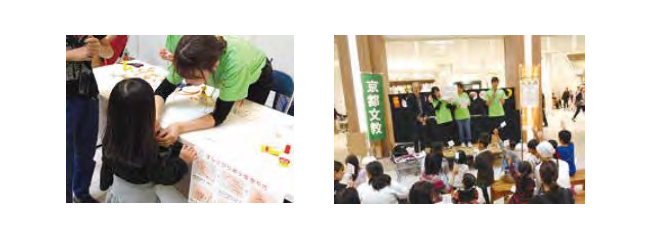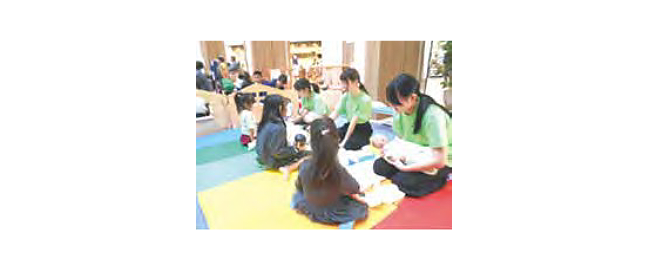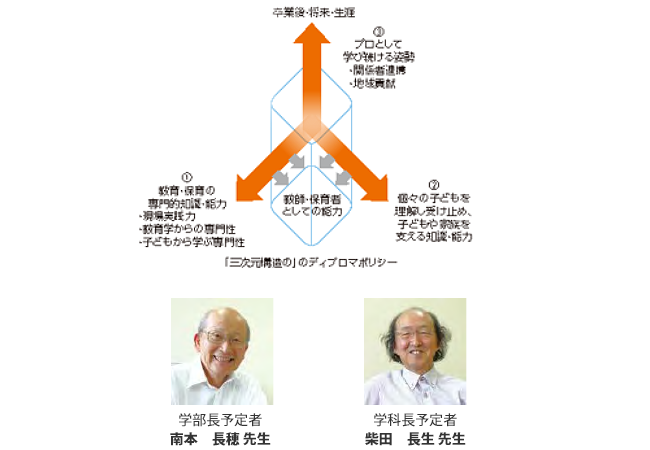As the birthrate continues to decline, the need for childcare and education continues to grow in order to carefully raise a small number of children.
At the same time, the line of sight toward the qualities and abilities of nursery teachers and teachers is becoming stricter.In addition to completing the training course set by the government, how far can we meet the demands of these times?There is a need to further improve the quality of university education with a view to making higher education free of charge.Under these circumstances, with a future-oriented curriculum, "Let's aim to be a talented elementary school, kindergarten teacher, and nursery teacher! 》, Kyoto Bunkyo University is planning to open a new faculty.
This is the Department of Child Education, Faculty of Child Education, which is the current Department of Education, Welfare and Psychology, Faculty of Clinical Psychology, with the addition of a training course for kindergarten teachers.We asked Professor Nagaho Minamimoto, who is scheduled to be the Dean of the Faculty, and Professor Nagao Shibata, who is scheduled to be the Dean of the Department, about the characteristics of training nursery teachers and teachers at Kyoto Bunkyo University and what the new faculty is aiming for.
About the features of the current department again
In 2012, one of the courses in the Department of Clinical Psychology said that the ability to understand human beings and sympathize with children's hearts acquired at the Faculty of Clinical Psychology and advanced communication skills such as counseling will definitely be useful in childcare settings. We have added a "Childcare and Welfare Support Course" to train childcare workers.We quickly turned our attention to the abuse of infants, and with a view to supporting parents in the midst of drastic changes in the child-rearing environment, we aimed to train childcare workers who can provide mental care and consultation support and can respond to child-rearing support in the local community. is.
At the same time, this attempt was part of the university-wide educational reform that started at that time, "clarification of the purpose of learning" expressed by the catchphrase "perfect" (meaning "perfect for me, perfect for my goals and career").Then, in 2013, the "Elementary School Teacher Training Course" was added, the name of the "Childcare Welfare Support Course" was changed to "Childcare Welfare Psychology Course", and the Department of Educational Welfare Psychology consisting of two courses was established in the Faculty of Clinical Psychology. And it is up to today.
As you know, our university opened the Faculty of Clinical Psychology for the first time in Japan in 2008, and since then it has formed one of the largest private schools in the field of clinical psychology, and various subjects offered by deep-level faculty members. Has become a major force in training nursery teachers and teachers from a clinical psychological perspective.
In addition, there are many small-group exercises from immediately after enrollment to graduation, and in addition to educational training and childcare training, practical exercises and internships are enriched, and most of them are "learned from the field" throughout the four years. It is also a major feature of our university that we have built a (on-site internship education system).In the teaching profession course, the school internship starts from the first year (second half), and after that, the curriculum is developed from the third year to the fourth year with the internship as the axis.In the training of childcare workers, on-site field tour training is started from the first year, and childcare training is held three times in the third and fourth years.Furthermore, when a new department is opened, a childcare internship will be newly established in the second year (elective courses), and overseas internships (elective courses) will be prepared for both courses.

In addition, one of the active activities of our university is regional cooperation activities.Students plan events in areas related to children and child-rearing, such as learning and leisure support for children's cafeterias, abuse prevention campaigns by students [upper photo], and various child festivals [lower photo], and actively participate as extracurricular activities. It is also a big feature.
Coordinating training and internships, negotiating with dispatched laborers, and backing up the "Teaching and Childcare Welfare Support Center" that provides employment support cannot be overlooked.In addition to providing free measures for teacher recruitment exams, we also support inquiries about employment and small group activities according to the desired workplace for students aiming to become nursery teachers, and support nursery teachers and elementary school teachers. It also contributes to the high recruitment record of.

About the new faculty
Newly trained kindergarten teachers and learn from the perspective of "Kindergarten Connection"
In the new faculty, the training of kindergarten teachers has begun, and the current "Childcare and Welfare Psychology Course" will be renamed to "Early Childhood Education Course" and "Elementary School Teacher Training Course" will be renamed to "Elementary School Education Course".Setting up a course to become a kindergarten teacher not only leads to the enhancement of the field of early childhood education, which until now was only the acquisition of childcare worker qualifications, but also by coordinating with the "elementary school education course", it is possible to grasp children in a unified manner. It enables professional training with an awareness of "Kindergarten Connection". Taking the two subjects of "Introduction to the teaching profession (small)" and "Introduction to the teaching profession (young)" as an example, in the latter, 15 out of 10 lectures are taught by an early childhood education specialist, and the rest. Since elementary school education specialists are in charge of these five times (the opposite is true for "Introduction to the Teaching Profession (Small)"), students can see the entire teaching profession and realize and understand the meaning of childhood connection.
A "triple structure" curriculum that enhances children's understanding and ability to support children
There is a nationally established training course for teacher training and childcare worker training, and if you complete and graduate, you will be able to obtain national qualifications and licenses.However, in recent years, the environment surrounding children has changed due to the expansion of the media world, changes in the family structure, and the decline in the educational ability of the region, and it can be said that it is not enough to deal with the new challenges that arise from it.
Therefore, in order to produce high-quality nursery teachers and teachers who have acquired the qualities and abilities required in these times, the new faculty will "learn from the field" throughout the four years and have positive qualities as nursery teachers and teachers.・ We have further enhanced abundant development subjects to acquire abilities, and devised a curriculum structure and structure that makes it easy to acquire.It may be said that we aim to build a curriculum that meets the two requirements of course certification and quality assurance of education, which are becoming stricter year by year.
Specifically, the curriculum policy (CP) based on the "three-dimensional structure" diploma policy (DP) (the power you want to acquire at the time of graduation, the image of nursery teachers / teachers you want to aim for) [the figure below] is reflected in the curriculum map. , We will position all the courses required for each grade, including training courses.
First, based on DP1, there are three subject areas: basic lectures and specialized lectures for acquiring licenses and qualifications, and specialized practical exercises. Arrange two subject areas.In the advanced subject group, we have established original subjects to learn specialized knowledge in related peripheral areas such as medicine, clinical psychology, developmental clinical psychology, family and school social work, and practical conferences, and at the same time, they have been established in the clinical psychology department. You will also be able to take a wide range of specialized subjects.Based on DP2, we have set up the training of "qualities and abilities that can continue to be learned and comprehensive qualities and abilities as teachers and nursery teachers", and are clinically and practically centered on practical training for four consecutive years. By combining the seminar practice system, we will set up two subject areas, and arrange subjects to improve practical skills, attitudes to continue learning, and subjects to cultivate a perspective that gives a bird's-eye view of future careers.
By the way, I think that the "triple curriculum structure" that spreads out the education subject group and the development subject group is also a big feature of the new faculty, with the elementary school subject and the elementary childhood subject to learn about each elementary school subject and the XNUMX areas of childcare in the center.
Realize growth through IT evaluation
Since last year, the university has been promoting the IT systemization of medical records in line with the reform of the syllabus, and students will use the "teaching profession medical records" and "nursery teacher medical records" according to the course they belong to.You can browse and register from the dedicated app, and every six months, you can check not only the status of taking each subject but also the degree of achievement of the syllabus goal, and a mechanism to promote the realization of DP and self-evaluation to become a better profession. It has become.I hope that the new faculty will be able to confirm the university-wide slogan "real feeling, growth potential" every day and utilize it for tomorrow's study.


